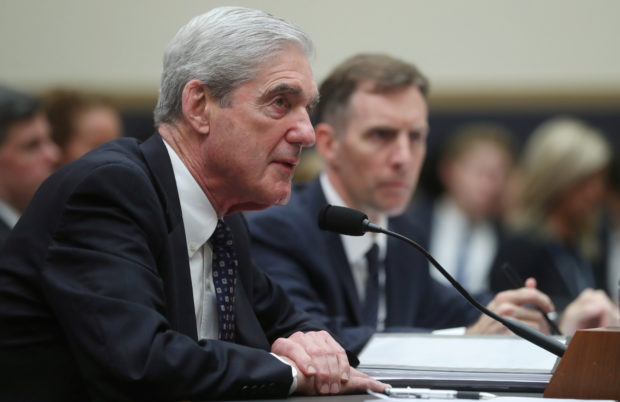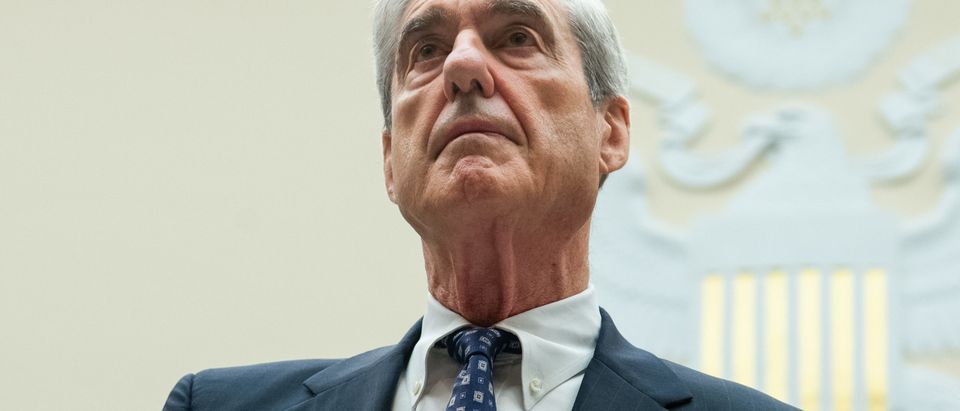- Robert Mueller’s much-anticipated congressional testimony is over, and little has changed.
- As was widely expected, the former special counsel offered up no major bombshells in over five hours of testimony to two congressional committees.
- Mueller appeared confused and shaky throughout his testimony, and fell short of providing information that Democrats hoped would support the case for impeaching Trump.
Robert Mueller’s congressional testimony Wednesday lived up to expectations, in that the former special counsel offered up no bombshells during his five-hour-plus testimony before two House committees.
Democrats and Republicans alike predicted ahead of Mueller’s highly anticipated appearance that he would stick closely to his 448-page report on the Russia investigation. The former FBI director largely did that Wednesday, at least when he was able to recall what his investigation found.
Conspiracy and obstruction were the two major areas explored in Mueller’s probe. On the conspiracy front, Mueller reiterated that prosecutors were unable to establish that members of the Trump campaign conspired with Russia to influence the 2016 election.
Mueller dropped one would-be bombshell on the issue of obstruction, only to walk it back later in the day.
In his first round of testimony before the House Judiciary Committee, Mueller said President Donald Trump was not charged with obstruction because of Justice Department policy against indicting a sitting president.
He issued a correction during his opening statements before the House Intelligence Committee, saying his initial remarks were inaccurate. (RELATED: Mueller Starts House Intel Testimony With A Major Correction)
“As we say in the report, and as I said in the opening, we did not reach a determination as to whether the president committed a crime,” he said.
That was not Mueller’s only stumble Wednesday.
The 74-year-old former FBI director frequently appeared not to know the basics of his investigation, leading to commentary from even his most ardent supporters that he appeared shaky and ill-prepared for the hearings. He also asked lawmakers 48 separate times to repeat questions.

Former Special Counsel Robert Mueller testifies to House Intelligence Committee at a hearing on the Office of Special Counsel’s investigation into Russian Interference in the 2016 Presidential Election on Capitol Hill in Washington, U.S., July 24, 2019. REUTERS/Jonathan Ernst
At one point, Mueller said he was “not familiar” with Fusion GPS, the opposition research firm that commissioned the Steele dossier. Fusion GPS has been a hot topic of debate for more than 30 months, since the dossier was published.
During one round of questioning from Georgia Rep. Greg Stanton, also a Democrat, Mueller misremembered which president appointed him U.S. attorney in Massachusetts. Ronald Reagan made the appointment in 1986, but Mueller initially said he was selected by George H. W. Bush.
When Mueller could remember areas of his investigation, he often refused to discuss them.
He repeatedly said the Steele dossier was “outside the purview” of his probe. He refused to discuss the document, which the FBI used to form the basis of much of its investigation into the Trump campaign, because of an ongoing Justice Department inspector general’s investigation.
He also declined all questions about Joseph Mifsud, a Maltese professor who met with Trump campaign adviser George Papadopoulos. Mueller’s report said Mifsud lied to the FBI about his contacts with Papadopoulos. But when Ohio Rep. Jim Jordan pressed Mueller on why Mifsud did not face charges as Papadopoulos did, the former special counsel said repeatedly: “Can’t get into that.”
Democrats also ran into roadblocks with Mueller, especially on the issue of the FBI’s counterintelligence investigation into Trump. In the aftermath of the report’s release — and its finding that Trump & Co. did not conspire with Russia — House Intelligence Democrats have asserted that the Russian government could have leverage over Trump and his associates.
Mueller shed little light on the counterintelligence component of the investigation.
Republican Rep. Brad Wenstrup did get Mueller to acknowledge that his investigation did not find that Trump was a Russian agent, as some Democrats have claimed.
Though Democrats had tempered expectations for the hearings going into Wednesday, they had hoped Mueller would help support the case for impeaching Trump. Those hopes appeared all but dashed as Mueller stopped far short of providing a strong rationale for removing Trump from office.
The road to impeachment would have been helped if Mueller said he would have indicted Trump on obstruction charges if he were not president, by revealing the Russian government had some sort of compromising information on Trump, or by stating directly that Trump should be impeached.
Mueller repeatedly refused delve into whether he was recommending impeachment.
Mueller repeatedly emphasized that his report did not exonerate Trump, as the Republican and many of his supporters have claimed. But while Mueller’s emphasis on non-exoneration was beneficial to Democrats, it also opened him up to an aggressive line of questioning from Texas Rep. John Ratcliffe, a former U.S. attorney and member of both House committees that questioned Mueller.
“Can you give me an example other than Donald Trump where the Justice Department determined that an investigated person was not exonerated because their innocence was not conclusively determined?” Ratcliffe asked Mueller during the Judiciary Committee hearing.
“I cannot,” said Mueller, adding, “But this is a unique situation.”
Ratcliffe then accused Mueller of embracing an “inverted burden of proof.”
“Nowhere do those words appear together because respectfully, respectfully, director, it was not the special counsel’s job to conclusively determine Donald Trump’s innocence or exonerate him because the bedrock principle of our justice system is a presumption of innocence,” said the Republican.
“Everyone is entitled to it, including sitting presidents. And because there is a presumption of innocence, prosecutors never ever need to conclusively determine it. Now director, the special counsel applied this inverted burden of proof that I can’t find and you said it doesn’t exist anywhere in the department policies and you used it to write a report.”
Another Republican tripped Mueller up on what his report said about the use of the terms “collusion” and “conspiracy.”
Georgia Rep. Doug Collins, the top Republican on House Judiciary, quizzed Mueller over the two terms.
“In the colloquial context, known public context, collusion and conspiracy are essentially synonymous terms, correct?” Collins asked during his opening remarks.
“No,” Mueller replied.
Collins then read directly from Mueller’s report, stating that “as defined in legal dictionaries, collusion is largely synonymous with conspiracy as the crime is set forth in general conspiracy statute 18 USC 371.”
“Now, you said you chose your words carefully, are you contradicting your report right now?” Collins asked.
All content created by the Daily Caller News Foundation, an independent and nonpartisan newswire service, is available without charge to any legitimate news publisher that can provide a large audience. All republished articles must include our logo, our reporter’s byline and their DCNF affiliation. For any questions about our guidelines or partnering with us, please contact licensing@dailycallernewsfoundation.org.












